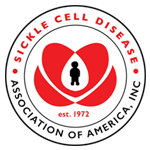What is sickle cell disease?
Sickle cell disease is an inherited disorder that affects red blood cells. People with sickle cell disease have red blood cells that become hard and pointed instead of soft and round. Sickle cells cause anemia, pain and many other problems.
What is sickle cell trait?
If you have sickle cell trait, you have inherited the gene for sickle cell disease. Sickle cell trait does not turn into sickle cell disease. If someone has sickle cell trait and his partner has sickle cell trait they may produce a child with sickle cell disease. There are about 2.5 million people in America with sickle cell trait.
If sickle cell trait is not an illness, why are people tested?
People are tested for sickle cell trait so they understand if they might be at risk of having a baby with sickle cell disease.
What medical problems are caused by sickle cell disease?
The blockage of blood flow caused by sickled cells leads to many complications including chronic pain, infection, lung tissue damage, blindness, kidney disease and stroke.
How many people have sickle cell disease?
Sickle cell disease is a global health problem. In the United States it is estimated that over 100,000 people have sickle cell disease. About 2,000 babies are born with the disease each year in America.
How long does a person with sickle cell disease live?
The average life expectancy in America has improved since all children are now screened for it. Life expectancy has now increased to the mid 40 years of age range.
Are people of African descent the only group affected?
No. It is really important to recognize sickle cell disease is not just a disease of black people. Latinos have the second most common incidence in the US. Importantly, sickle cell disease is present globally including in those of the following ancestries: Portuguese, Spanish, French Corsicans, Sardinians, Sicilians, mainland Italians, Greeks, Turks and Cypriots. Sickle cell disease also appears in Middle Eastern countries and in Asia. The country with the third highest prevalence in the world is India.
Is there a cure?
There is no universal cure for sickle cell disease. Those who are eligible to receive a bone marrow transplant do have a chance at a cure. Research in gene therapy is currently underway.
What are some promising treatment developments?
There are dozens of new treatments currently under investigation. Recently, in 2017, the first new treatment for SCD was approved by the FDA. Endari reduces the frequency of pain episodes and can be given to individuals age 5 and older who either do or don’t already take hydroxyurea.
Can people with sickle cell disease live a productive life?
Yes. But like all patients with chronic disease, sickle cell patients are best managed in a comprehensive multi-disciplinary program of care and a strong extended support system.
